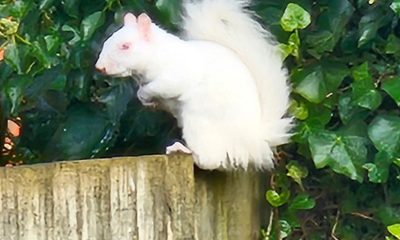By Mark Waghorn via SWNS
Brainy birds will fare better under climate change, according to new research.
Ravens, crows, jays, and magpies are among the most intelligent animals on Earth.
Now a study has identified a direct link between cognitive power and a physical response to warming.
Many migratory birds are shrinking as temperatures have risen over the past 40 years.
But those with very big brains, relative to their body size, did not reduce as much as peers with less grey matter.
Lead author Justin Baldwin, a PhD candidate at Washington University in St. Louis, said: "As temperatures warm, body sizes are decreasing.
"But larger-brained species are declining less strongly than small-brained species.”
The changes in songbirds are significant - affecting familiar species of sparrows, warblers and thrushes.
They are so pervasive some scientists have suggested they are a universal response to warming.
The study in Ecology Letters shows bigger-brained birds are out-thinking shrinking - at least to a certain extent.
The US team analyzed information on some 70,000 birds that died when they collided with buildings in Chicago from 1978 to 2016.
They combined the vast dataset with brain volume measurements and lifespan data for 49 of 52 species of North American migratory birds.
The bodies of those with very big brains reduced about a third less - suggesting improved behavioral flexibility in birds.
Baldwin said: "Relative brain size correlates with increased learning ability, increased memory, longer lifespans and more stable population dynamics.
"In this case, a bigger-brained species of bird might be able to reduce its exposure to warming temperatures by seeking out microhabitats with cooler temperatures, for example."
Songbirds may be getting smaller as heat causes stress - helping them dissipate it better.
But it increases the risk of predation or reduced competitive ability. Having a larger brain may offer alternatives that are not available to small-brained species.
Co author Dr. Carlos Botero said: "One of the first things that jumps out to me from these findings is we can already see that climate change is having a disproportionate effect on species that have less capacity to deal with environmental change through their behavior.
“This doesn't mean climate change is not affecting brainy birds or brainy birds are going to do just fine.
"What our findings suggest is climate change can have a much stronger effect on the less-brainy birds."
The findings have implications for conservation as three billion birds, about one in three, have been lost in North America since the 1970s.
Mr. Baldwin said: "That is probably a lot of natural selection that hits different species differently.
"Rapid changes in the environment often produce a few winners and a whole lot of losers, which is really unfortunate.
"Many wildlife populations have moved toward colder places as the planet has warmed.
"Selection forces those that don't move to adapt, for example, by changing their body size."
He added: "The species we studied only spanned a two-fold difference in relative brain size, which was enough to reduce the effects of increases in breeding temperature by 70 percent.
"This tells us that even small differences in cognition matter."
Smaller-brained species might be under especially strong natural selection.
Planners need to take this into account for conservation management.
Mr. Baldwin added: "When it comes to climate change mitigation and planning, a major goal is to maintain population-level connectivity.
"We want to allow species to move toward the poles or upslope in elevation, to keep up with warming climates.
"Our findings suggest this type of intervention could be especially important for smaller-brained species."

 Parenting1 week ago
Parenting1 week ago
 Lifestyle1 week ago
Lifestyle1 week ago
 Wildlife3 days ago
Wildlife3 days ago
 Good News4 days ago
Good News4 days ago
 Health4 days ago
Health4 days ago
 Entertainment1 day ago
Entertainment1 day ago
 Work2 days ago
Work2 days ago
 Broadcast6 hours ago
Broadcast6 hours ago






















